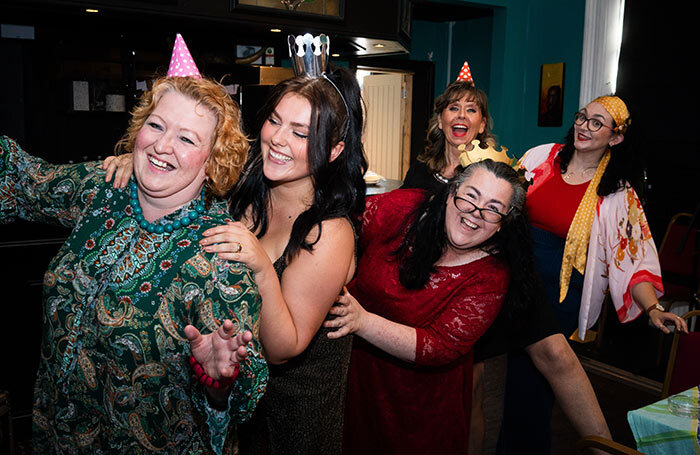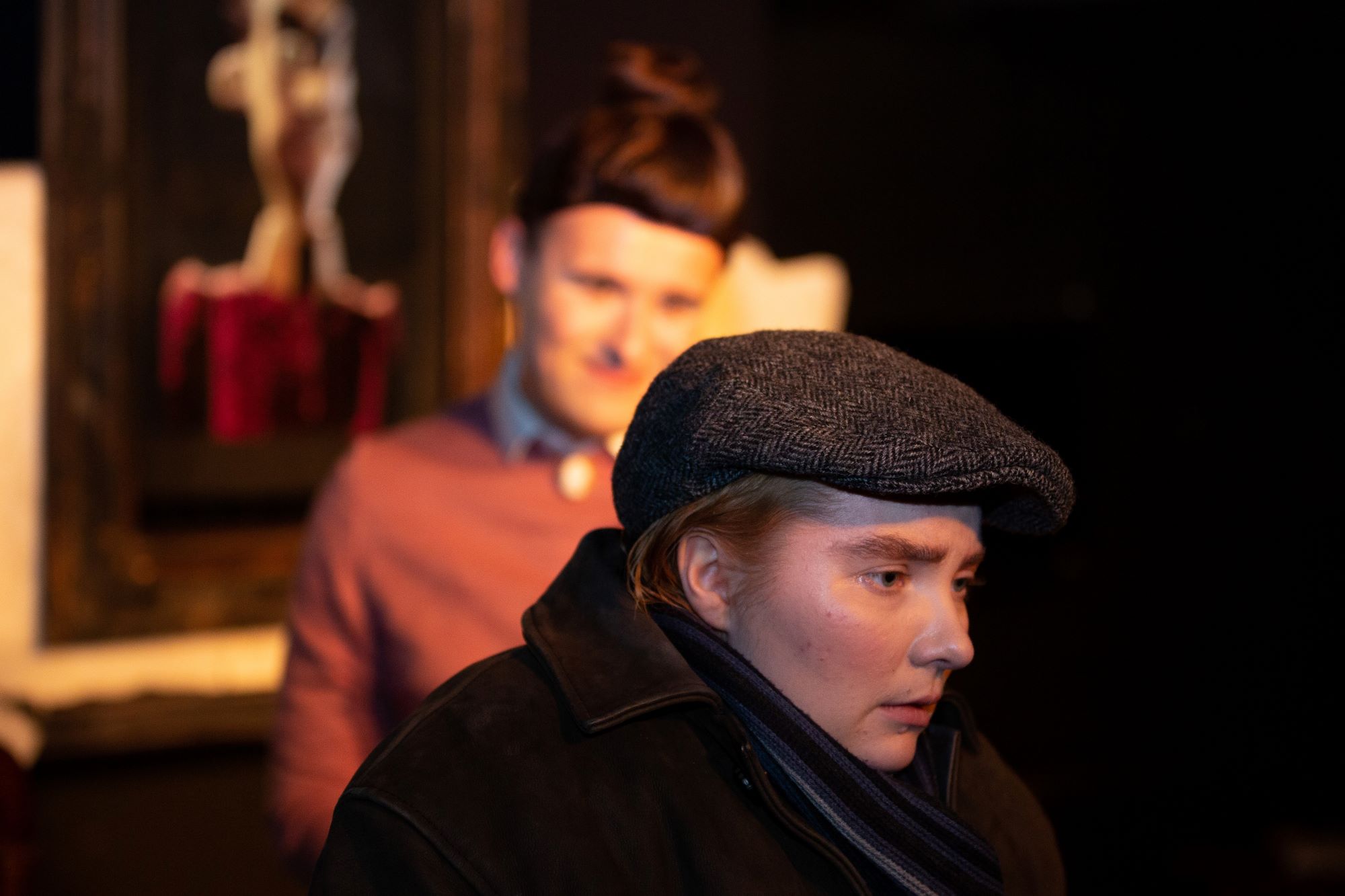With Live’s year ahead now covered, it’s now time for the other press launch I was invited to. Laurel’s (a subtle rebranding that is now named after one particular Mr. Laurel rather than two) has had an excellent 2022 and 2023, with a transfer of their megahit Gerry and Sewell to Live Theatre last November, and now an upcoming project in partnership with the National Theatre. That particular project is a long-term thing, and is not part of the upcoming season. Instead, there’s a heavy crossover with the Richard Jenkinson commission.
First, a catch-up on the Richard Jenkinson Commission. I was planning to cover this separately from the season launch – Live Theatre might have had its playwriting competition and season launch at the same event, but so far, the two things are running independently of each other. By contrast, in spite of the two things being announced separately, the Richard Jenkinson Commission has become virtually inseparable from Laurel’s artistic programme. And one thing that has influenced this is how this worked.
In theory, both contests worked by the same principle: you could submit a script, but you didn’t have to. In Live’s case, the “detailed treatment” was viewed as an alternative to spending a lot of time writing a script now – it’s not clear how many people took up this offer in how they fared, but the finalist I know of did scripts. The Richard Jenkinson Commission, however, was a lot more geared towards to submitted an “idea”. It was mentioned that a straight script submission was fine, but I am told the ideas generally did a lot better than the scripts.
What the two did have in common, however, was that they both did a much better job of providing opportunities to those who need it than the big national competitions, with most or all of the shortlisted entrants not needing the extensive list of credits that almost all Bruntwood and Verity Bargate finalists how. One small but important clarification: unlike the North East Playwriting award, the Richard Jenkinson Commission wasn’t actually restricted to the north east. Laurel’s is best known to the north east and it was predominantly publicised in the north-east, and most of the names I recognise are north-east names. One notable exception, though, is Dave Bibby of Baby Dinosaur fame. One upcoming dilemma if this is done again – and mood is it will – one would expect work to get round of how good an opportunity it is to get work on stage, which is turn could be more uptake from outside the north-east. There means more good ideas to choose from – but also heavier competition against aspiring north-east artists. Should you stick with open to all, or restrict it to the north-east? That will be an interesting choice.
Anyway, what was originally intended to provide one entry to the 2024 programme has gone on to dominate the season. A second commission was offered during the ceremony, and now we have three. The ideas that have made it to production are: Subterranea, a post-dystopian society where the underlings were forced to shelter in the Metro after a nuclear attack, were never allowed to leave, and now have their own society; Doomgate, a three-writer collaboration of horror stories set on a single street; and most cryptic of all is the commission winner Seagulls & Sad Sad Stories which features three down-on-luck sixteen-year-olds putting their trust in the fortune-telling of an Zoltar in South Shields.
One thing that is notable is that in the two years Laurel’s has been running, it’s grown from a two-man operation to a bigger team – and now, a board of trustees with the power to overrule the artistic director. Anyway, we have Steve Robertson and John Hickman, arguably the numbers 2 and 3 at Laurel’s, doing their own play Stake Out at Halloween. Should the people who work in theatres get preferential treatment in their own work being programmed? My view is a strong yes. Running a venue is hard work, most of which goes into enabling other people to put on their shows, and if you get modest pay for your efforts your are very lucky. I firmly believe that giving your hardest workers their turn on the stage is the least you can do in return – and people who watch other productions take the the stage day in day out tend to know what they’re doing. So I’m looking forward to this comedy-horror set in the worst dives of Newcastle nightlife.
And one final thing that grabs my attention in the Christmas Production of Winnie the Pooh. Except this is the treatment all famous literary works get once they’re out of copyright. John Dole plays a take-no-crap the lovable bear vowing vengeance of the bastard property developers who’ve ruined the Hundred Acre Wood. Not clear if this is for children, and definitely not for literary purists. But if you like rewrite everything out of copyright to have ninjas (come on, who doesn’t want to see Peter Rabbit and the Ninjas), this is for you. (Oh, and … pssst, technically Winnie the Pooh doesn’t go out of copyright in the UK until 2027. You might want to call it a parody to be on the safe side.)
And there’s plenty more stuff as well. None of these I’m recommending over any others at the moment – I’ve seen hardly anyone in this programme before, so it’s all to play for. One seemingly unintended side-effect of the programme process is that the Laurel’s season is actually quite sparse until July, and then chocka from August. But the experience of pretty much every start-up arts org is that you always spend the first few years making up the rules as you go along.
But compared to even even twelve months ago, Laurel’s has come on leaps and bounds. Expect to be hearing a lot more of Laurels in the second half of this year.
What about the Exchange?
There is one other thing from last year’s launch that I haven’t forgotten, which is what was going on with The Exchange. This venue in North Shields had been built up in North Shields, and then, out of the blue, the news broke that they’d lost the lease of the building, with it going instead to Stonebanks Investments. Given Jamie Eastlake’s own experience with being ejected from premises, Laurel’s very much took the side of the ejected Exchange team now.
North Tyneside Borough Council, however, argued that The Exchange wasn’t closing – it was part of their “Cultural Quarter” scheme for North Shields. This attracted some suspicion, because until now, this so-called “Cultural Quarter” scheme only really entailed doing up some streets. And, let’s face it, if you’re trying to seek the confidence of the local people that’s you’re an arts-savvy organisation, “Stonebanks investment” is about the least cultured name you could have. It also didn’t instil much confidence that all the new management – including the theatre manager – had zero background in arts organisations. And, I have to say, the new catchphrase “Built in 1856, Reborn in 2023” did sound a bit twattish to me, the insinuation being that everything the old management did prior to 2023 didn’t count.
Coupled with sycophantic news coverage which was obviously a rehash of press releases setting off every marketing bullshit alarm known to man, I could help but speculate that they weren’t really interested in running a theatre space: just the cafe and bar which is where their previous experience lay.
But … let’s give credit where it is due: the theatre is running again, with a reasonable meaningful programme. A lot of it does seem to be last-minute. At the time of writing, there’s roughly one booking every 3-4 day, but later in the year it’s more like once a month. And there’s an awful lot more tribute acts than theatre. There again, that situation’s not unique to Exchange 1856 – Sunderland Old Fire Station is also a very theatre-lite theatre. I don’t the programme is as varied as The Exchange was under the old management, but maybe it will take time to rebuild a list of returning acts.
The reason I have been able to check this out is that Blowin’ a Hooley did their short play night at The Exchange – indeed, this was officially a co-production between themselves, Exchange 1856 and The Gala in Durham. It is not clear whether Exchange 1856’s involvement is wholehearted, or simply done out of obligation to North Tyneside Council, but either way, they do seem to be making progress. And it certainly looks like they know how to run a theatre bar. And, let’s be realistic, that’s how theatre’s make a lot of their money these days. Without a lucrative bar, you can expect a lot less theatre.
However, on balance, it still does seem like theatre has taken a step backward against what there would have been had The Exchange remained in charge. The daft thing is that there was no need for it to be this messy. Why oh why was a change of leaseholder left so late that programme acts had to be cancelled? And, more to the point – why didn’t The Exchange and Stonebank Investments just work together. Even in their new-found enthusiasm for performing arts is genuine, Stonebank were never going to be as cut out to run a theatre as their predecessors. Stonebank, however, are well placed to do a better job of the bar. Why not let The Exchange programme and run the theatre, and have Stonebank do the bar, giving both parties a role doing what they do best?
In summary, what’s happened at the Exchange isn’t as bad as we feared – and this pales into insignificance compared to the shenanigans around the Vault Festival. But it was handled badly, and quite needlessly. And it does little to bring back trust in landlords. My position for arts orgs remains unchanged: never trust your landlord. They can turn on you without warning – always be ready for this.


 We begin with a celebration. Suzie is the first person ever from this town to have been accepted at Cambridge. It’s through this lens that we see how different the two worlds are. For Suzie, there’s a whole new life being opened up for her; for her older sister, the expectation is to just have kids, something she’s quite content with. Being the 1970s, it also passes without comment that the local WMC sex pest is policed by warning the young women not to end up alone with him (instead of, you know, telling him not to be a sex pest). What doesn’t pass without comment, however, is just how much of the menial work falls to the women – but without being full members they don’t get a say in how the club runs.
We begin with a celebration. Suzie is the first person ever from this town to have been accepted at Cambridge. It’s through this lens that we see how different the two worlds are. For Suzie, there’s a whole new life being opened up for her; for her older sister, the expectation is to just have kids, something she’s quite content with. Being the 1970s, it also passes without comment that the local WMC sex pest is policed by warning the young women not to end up alone with him (instead of, you know, telling him not to be a sex pest). What doesn’t pass without comment, however, is just how much of the menial work falls to the women – but without being full members they don’t get a say in how the club runs. Willard Tweedy now lives alone. Tweedy’s Farm is gone, and he reminisces about the last days of his family business. Some details of the story are new, such as the increasing dominance of Melisha when she married in, and the back-story of RAF mascot Fowler. Some other bits are the story we know in a new light: how Melisha scoffed when he said the chickens were organised – “Oh, but it turned out they were”, he muses. But at 6 o’clock every evening, his wife calls by to check up on him. One piece of unfinished business is the matter of how Mrs. Tweedy survived the exploding chicken pie and collapsing farm building. I’ll refrain from the spoiler, even though it’s not too hard to guess – but one small detail from the final moment of the film is a pivotal moment to Mr. Tweedy’s life now.
Willard Tweedy now lives alone. Tweedy’s Farm is gone, and he reminisces about the last days of his family business. Some details of the story are new, such as the increasing dominance of Melisha when she married in, and the back-story of RAF mascot Fowler. Some other bits are the story we know in a new light: how Melisha scoffed when he said the chickens were organised – “Oh, but it turned out they were”, he muses. But at 6 o’clock every evening, his wife calls by to check up on him. One piece of unfinished business is the matter of how Mrs. Tweedy survived the exploding chicken pie and collapsing farm building. I’ll refrain from the spoiler, even though it’s not too hard to guess – but one small detail from the final moment of the film is a pivotal moment to Mr. Tweedy’s life now. First, a catch-up on this bit of theatre history. The mind-17th century wasn’t a great time to be a theatre. Firstly they were all shut down by Oliver Cromwell because the Puritans decided this was a bit too much like fun; they they had to be shut down because of a plague. Before the plague, however, Charles II liked fun and insisted the theatre re-opened, and also insisted women should be allowed on stage. Huzzah, a great advancement for equality. Well, sort of. If you were a woman, the only real way of securing a career in theatre was to get you tits out on stage, or sleep with the theatre owner and/or major donor. In spite of this, Nell Gwyn played that game well and made herself a celebrity, with her and King Charles famously exchange flirting from stage to royal box, making the audience think “are they or aren’t they?” (Spoiler: they are).
First, a catch-up on this bit of theatre history. The mind-17th century wasn’t a great time to be a theatre. Firstly they were all shut down by Oliver Cromwell because the Puritans decided this was a bit too much like fun; they they had to be shut down because of a plague. Before the plague, however, Charles II liked fun and insisted the theatre re-opened, and also insisted women should be allowed on stage. Huzzah, a great advancement for equality. Well, sort of. If you were a woman, the only real way of securing a career in theatre was to get you tits out on stage, or sleep with the theatre owner and/or major donor. In spite of this, Nell Gwyn played that game well and made herself a celebrity, with her and King Charles famously exchange flirting from stage to royal box, making the audience think “are they or aren’t they?” (Spoiler: they are). Alphabetti Theatre programming is dominated by representation of various minorities, but the worst mistake you can make is to assume everybody within a minority thinks the same and has the same experiences. It was great that Alphabetti took on
Alphabetti Theatre programming is dominated by representation of various minorities, but the worst mistake you can make is to assume everybody within a minority thinks the same and has the same experiences. It was great that Alphabetti took on 
 But, in spite of the very strong competition, there could only be one winner, and that is Samuel Bailey with
But, in spite of the very strong competition, there could only be one winner, and that is Samuel Bailey with 

